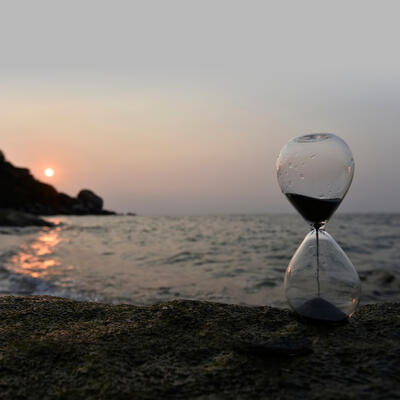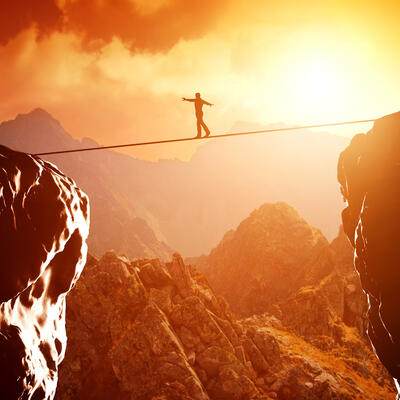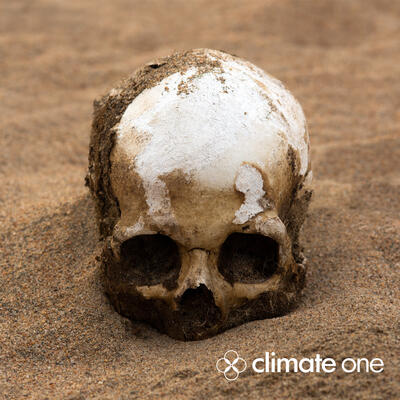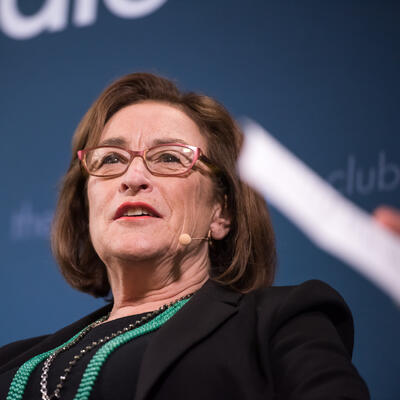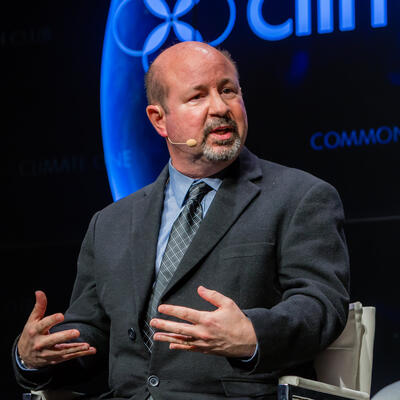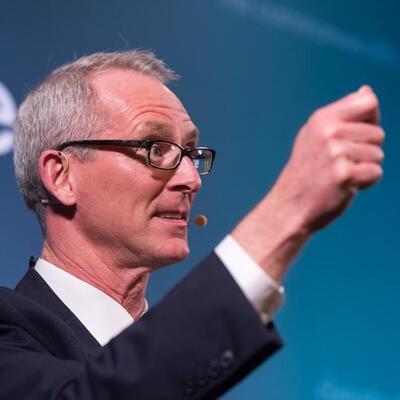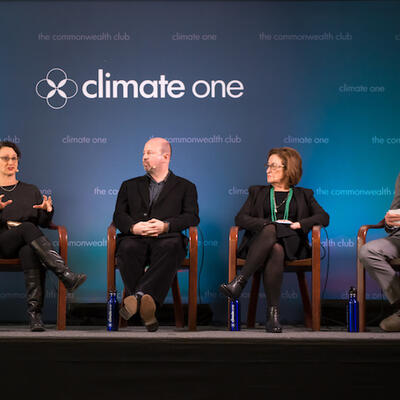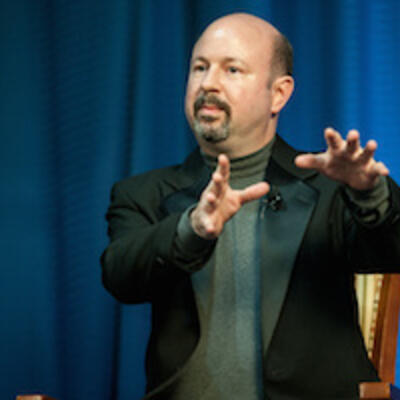
Political Science
Guests
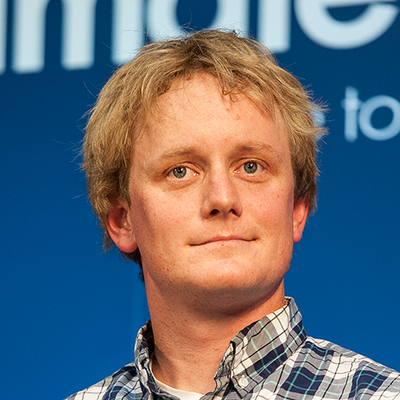
Bill Anderegg
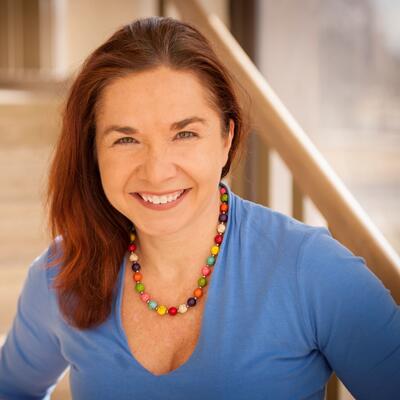
Katharine Hayhoe
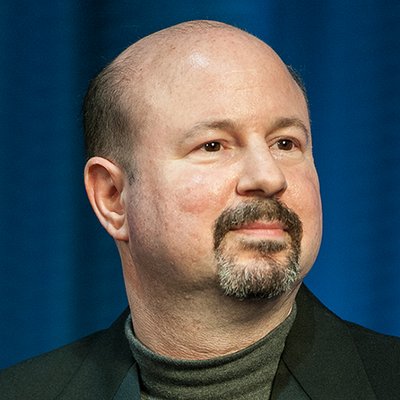
Michael Mann
Summary
Michael Mann, Katharine Hayhoe, and Bill Anderegg tackle the political nature of climate science and their experiences as ‘climate warriors.’
Michael Mann warns that "we can't allow science to be killed. We can't allow the scientific agenda to be set by those that have vested interests to not have the truth be unveiled." Over the past decade climate science has become increasingly politicized. Today many candidates claim the science is unsettled and scientists are the targets of smear campaigns. Climate scientists who have taken on public roles cope with personal threats, hacking attacks and assaults on their professional integrity. "We are not in this because we value people's opinions of us. We are not in this because we want to receive pleasant emails in the morning. We are in this because this is the truth and we have to tell it," said evangelist climate scientist Katharine Hayhoe.
Michael Mann, Katharine Hayhoe, and Bill Anderegg discuss their experiences as climate scientists in a field under the magnifying glass of politics, economics and amplified emotions.
Full Transcript
Greg Dalton: Welcome to Climate One, a conversation about America's energy, economy and environment. I'm Greg Dalton.
Seven years ago, there was a broad political consensus in Washington, D.C., that burning fossil fuels releases heat-trapping gases that could alter the Earth's atmosphere. John McCain, Newt Gingrich and coal state Democrats accepted the fundamentals of climate science and the need to reduce carbon emissions. Today it's a different story. Republicans and Democrats are loathe to mention climate, and the percentage of Americans who say humans are the primary cause of global warming is much lower than it was in the second term of President George W. Bush. Skeptics are winning the climate communication battle even as temperatures rise, and the number and intensity of floods and droughts increases worldwide.
Over the next hour, we'll discuss the politicization of high school physics and chemistry, and how science has communicated in the public realm. Along with our live audience at the Commonwealth Club in San Francisco, we're joined by three distinguished scientists. Michael Mann is professor of Geosciences at Penn State, and author of The Hockey Stick and the Climate Wars. Katharine Hayhoe is professor of Atmospheric Sciences at Texas Tech University and co-author of A Climate of Change: Global Warming Facts for Faith-Based Decisions. And Bill Anderegg is a graduate student at Stanford University who is a researching forests in the American West. Please welcome them to Climate One.
[Applause]
Greg Dalton: I should mention that Bill Anderegg is pinch-hitting on very short notice for Terry Root who couldn't be here today due to a family emergency. So thank you for stepping in on short notice. Michael Mann, you published a seminal work study on The Hockey Sticks. So tell us what The Hockey Stick is and how you got hit in the head with it.
[Laughter]
Michael Mann: Well, it's not a sports implement. It's actually a curve that my co-authors and I published more than a decade ago which attempted to reconstruct temperatures back in time. We only have about a century of widespread thermometer records around the world. So to place modern warming in a longer term context, we have to turn to what we call proxy data, things like tree rings and corals and ice cores, to piece together the puzzle of how the climate varied in the more distant past. And what this curve showed was that, well, it was relatively warm about a thousand years ago as far back as we could go. The recent warming exceeded anything that we've seen for at least the past 1,000 years. The graph became an icon in the climate change debate. It was featured in the summary for policymakers of the 2001 Fourth Assessment Report -- no, the Third Assessment Report of the IPCC, the Intergovernmental Panel on Climate Change. And when it became an icon in the climate change debate, those who find the science of climate change inconvenient saw the need to try to discredit this graph. And indeed, they saw discrediting me as a way of trying to do that, and so much like many of my colleagues, my other climate science colleagues in the past have been attacked, even vilified, for the work that they've done that demonstrates the reality of climate change. So, too, was I vilified for "The Hockey Stick." And my book tells the story of what it's like to be a scientist and find yourself sort of an involuntary and accidental public figure.
And what I've tried to do, you know, if I'm gonna be put in the limelight in the way that our detractors have tried to put me in the limelight, you know, I'm gonna try to take advantage of that, and the book was part of my effort to do that.
Greg Dalton: Katharine Hayhoe, you say that you're willing to take it in the neck, and if not, you're not talking to the right people. What do you mean by that?
Katharine Hayhoe: [Laughter] Not to continue The Hockey Stick metaphor, yes. So getting whacked over the head --
Greg Dalton: You are Canadian, by the way, so -- yeah.
[Laughter]
Katharine Hayhoe: I am. I have my own and it's actually a real one. I feel like with climate change being so divisive right now, so polarized that if we as scientists are not getting attacked, then we're not talking to the right people. I feel a little bit almost like, you know, a doctor who ran a test and found a red flag of some potential disease you could have and decided not to tell you because they're afraid that you'd be angry at them. I mean that's ridiculous, but I feel like with climate scientists, we're the same way, we're taking the temperature of the planet, we're seeing some red flags and we have a responsibility to tell people about that.
Greg Dalton: Bill Anderegg, you're relatively new to this field, did you know what you were getting into when you decided to pursue a career in atmospheric science and these kinds of personal attacks will be part of the career that you chose?
Bill Anderegg: A little bit. I mean, having studied under Stephen Schneider and watching the experiences of Mike Mann and Katharine Hayhoe and others, I was prepared for the public scrutiny of the study, but we did a study on climate change and the proportion of scientists that sort of agree with this synthesis by the intergovernmental panel. And it's incredibly high -- 97%, 98%, and I was certainly not prepared for the personal nature and the kind of immediacy of -- the backlash that accompanied the study.
Greg Dalton: So what happened? You published a report that said the question that scientific qualifications of the so-called scientists who were skeptics and what happened? What was the consequence?
Bill Anderegg: Well, so our study did two things. First, we found that there's an incredibly high agreement behind what the IPCC had articulated as, as the main components of human-caused climate change. And then second, that those who are publically doubting and expressing their lack of agreement. Essentially, we're not very well qualified. The vast majority of them did not publish in the scientific literature. They hadn't studied atmospheric science or fields relevant. And the backlash was really immediate, that the hate emails came in quite rapidly. The blogosphere was sort of an amplifier to this, that it picked up these messages and suddenly, you know, your e-mail address -- and this has happened to plenty of climate scientists. Suddenly, your e-mail address is across a dozen blogs that are not very friendly.
Greg Dalton: Katharine Hayhoe, does this have a chilling effect?
Katharine Hayhoe: Oh, absolutely. I mean, when people post your picture and your e-mail address and encourage others to send you nasty e-mails, of course it can. I mean, I had the experience one time of opening my email in the morning after I'd been on the O'Reilly Show the night before and having over 200 messages from people I didn't know in a single morning. Out of those 200, one was nice. [Laughter] And the others were anywhere from unpleasant to actually downright evil.
Greg Dalton: And, Mike Mann, Freedom of Information Act Request, you have a couple of attorney generals who -- I mean, you--
Michael Mann: That's just one attorney general.
Greg Dalton: One attorney general? [Laughter] Okay, only one.
Katharine Hayhoe: It's enough.
Greg Dalton: But you really have had a target on your back because of "The Hockey Stick." What's that experience been like?
Michael Mann: Well, you know, it -- I believe that, you know, the attacks against me and other climate scientists are intended to have a chilling effect. They're intended to make an example out of us for others who might think of stepping up and participating in the public discourse or publishing scientific findings that have implications for human-caused climate change. I've also opened letters, like Katharine.
One letter contained a white substance and I actually had to have the FBI come in, and there was police tape over the door of my office at Penn State University. They had to send the material off to a lab. Fortunately, it turned out it was a harmless substance. It was only intended to intimidate me. It was only intended to send a chilling message to me. But that's, you know, part of the life of being a climate scientist today participating in the public discourse.
Greg Dalton: So when you are looking at a perspective research project, do you think, "Well, that one's kind of hot. I'm not gonna touch that one. I'm gonna --" you know, something like that. Does it affect your research choices and how you go about your job?
Michael Mann: Oh, not me. I mean, I've already made a commitment, you know, I'm gonna go down this road. You know, this is -- I see -- you know, the attacks against me have actually led me to recognize the importance of not being intimidated by these sorts of tactics, by not sending an example -- setting an example for younger scientists who might decide that, "Well, hey, maybe I should go into this other field." That is, I think in part, what our detractors would like to see. They would like to see, you know, a barrier set up to prevent other scientists from doing research that might have implications for, you know, our burning fossil fuels and policies related to carbon emissions. You know, we can't allow science to be chilled. We can't allow the scientific agenda to be set by those who have vested interests to not have the truth be unveiled.
[Applause]
Greg Dalton: Let's talk a little bit about who these people are, motivations. Katharine Hayhoe, you said that the skeptics or deniers actually have quite a firm grasp of facts and that they actually have facts on -- you know, they're well informed.
They may be -- yeah, expound on that.
Katharine Hayhoe: Well, my own personal experience living in West Texas is that the people that I meet in the grocery store or walking down the street or in the office next door, they know more about the issues surrounding climate change than the average person would who says, "Oh, we have to take action right away." Because they don't think it's a real problem, they have all these reasons to back up why they don't. And so that's why I don't believe that facts are enough. Now, as a scientist, I do think that facts are enough, but realizing that this is not necessarily an issue of facts; it's an issue of fear. There is an enormous amount of fear that we are dealing with an issue where the impacts are distant and far away, but the solutions are imminent and people fear them as being very costly and infringing on our freedom, our economy and our rights. So there's many emotional issues attached to this and I really feel like it's an issue of emotions not facts because, to circle back to the question you asked Mike, do I think about which research projects to do? No, because I don't get it for a research project. I get it for standing up in public and saying, "Climate is changing, humans are the cause and we're seeing the impacts." That's what we get it for. It's not new research. It's the basic facts that we have known for decades.
Greg Dalton: And so are you saying that facts don't persuade people? That after you come in a different way, how do you communicate then with someone who's a skeptic or denier? It's not facts. How do you do it?
Katharine Hayhoe: There's certainly a few people who facts are very important to, but like I said, it's gotten to the point where it's an emotional issue. It's about fear. It's about thinking that I'm a conservative and conservatives don't think this is true, or I'm a person of faith and this is incompatible with my faith that challenges the sovereignty of God. It challenges things that we hold dear and near to our hearts, not our brains. So that's why I feel like it's so important to start with the values that we share. We all live on this planet. We all want a better life for our children. We want a healthy economy. Those of us who hold to almost any major faith believe that creation is something to be taken care of. That people are to be loved. And so when we start from these shared values and then we build a case for taking action on climate change, we're starting from the identities that people already have instead of trying to make green tree huggers of the world.
Greg Dalton: Michael Mann, you've written about six stages of denial. Walk us through quickly those compatible --
Michael Mann: Well, so we've seen this retreat over, you know, since the time that I came in to the science of climate change back in early 1990s. You know, originally, the claim made by those who deny the threat of climate change, the claim was that the Earth wasn't warming. That soon became untenable because there was solid enough evidence that was mounting, not just thermometer records but independent lines of evidence that tell us that the planet is warming. So the next stage of denial was then, "Well, okay, it's warming, but this is part of a natural cycle." Then of course, that becomes untenable because of the work that climate scientists have done that demonstrate that the warming we've seen is not consistent with the pattern of what we would expect if it were natural causes rather than human factors that were responsible for the warming. So it goes on down that sort of -- so then, you know, the argument would be, of course, "Well, okay. Well, maybe it is -- part of that warning is due to human impacts, but it's pretty small and it's not gonna be very much in the future. The sensitivity of the climate system is at the low end of what the scientists say." And then eventually, that becomes untenable.
The science is pretty clear now on the fact that the climate system is quite sensitive. We're seeing that in the Arctic right now. We're seeing that Arctic Sea ice is retreating at a schedule that, in fact, is decades ahead of what the models were projecting. We're actually seeing changes unfold faster than what we expected. And then ultimately, and somewhat ironically, eventually it comes full circle. "Okay, well, it's too late to do anything about it anyways." [Laughter] "So we might as well just adapt to what's coming." And so one has to recognize that denial does take various forms and I think there are multiple constituencies that we're speaking to. It isn't a monolithic constituency.
Greg Dalton: Let's talk about that. There's some work done by Yale and George Mason University called the "Six Americas" that really breaks down sort of the approaches that Americans have toward climate change -- from alarmed, concerned, cautious, disengaged, doubtful and dismissive. So, Katharine Hayhoe, how do you fine tune your message to those different types of people?
Katharine Hayhoe: We're actually working on exactly that right now with some people who are experts in social psychology, media and marketing because, again, see, it's going off of the science. It's into us as people. How do we react to facts? How do we react to information? We all have different values. We all have different things that motivate us. And so we have to recognize that, for one person, making a better world for their child might be paramount. For another person, national security might be the issue that moves us. For someone else, a sense of responsibility, loving your neighbor or steward and creation might be what moves us to the next step. So even though there's a one size facts fit all, there's not a one size message fits all.
Greg Dalton: And that's a new thing within the scientific community. You are not trained to be communicators. You're trained to be researchers. Communication is not what you're paid for, it's not what gets you tenure, it's not what gets you professional accolades, et cetera. This is something on top of what you're all trained and expected to do. So how are you doing with that?
[Laughter]
Katharine Hayhoe: Well, we're doing it because, like I said, we have a responsibility. I feel like we have this issue. I think I probably speak for all of us here that if we hold silent on it, who will speak? We're not in this because we value people's opinions of us. We're not in this because we want to receive pleasant e-mails in the morning. We're in it because this is the truth and we have to tell it.
Greg Dalton: Katherine Hayhoe is a professor at Texas Tech. We're also talking with Michael Mann and Bill Anderegg at Climate One. I'm Greg Dalton. Then, you've also been a key person speaking to communities of faith and that's one of the most powerful levers, a lot of people in faith. So how do you get over that God sovereignty issue that humans can't affect creation?
Katharine Hayhoe: That is actually a fairly common question, but it's easy to answer. Just look around us today. Do we see things happening that are bad? Do we see consequences of poor choices that we've made? All the time. Somebody has a drink too many, gets in the car, kills an innocent person. We make poor health choices; it leads to health issues later in life. We see all the time evidence of reaping what we have sowed and there are even verses in the Bible that tell us that. So this no way challenges God's sovereignty. Rather, it's a reflection of the free will that he's given us to make choices and then to bear the consequences of those choices.
Greg Dalton: Michael Mann, anything to add to that?
Michael Mann: Yeah. You know, I think that at some level, you know, whether you want to frame this in terms of religious faith or ethics, to me, we focus so much on climate changes and issue of science or an issue of policy or economics, you know, cost-benefit analysis, but, you know, not often enough do we frame it for the issue that it really is ultimately. It's an issue of our ethical obligation. I have a daughter, who's seven years old, and I want to make sure that we don't make decisions today that we don't lock -- you know, that we don't lock in a future, a degraded Earth for her children and grandchildren through the decisions we are making now with our fossil fuel emissions. You know, to some extent, you know, we have gained economically from access to cheap, you know, dirty sources of energy, but there's a very real cost of that and that cost is gonna be borne increasingly down the road.
We still have time to avert a future where we leave our children and grandchildren a degraded planet, but there isn't a whole lot of time to do that.
Greg Dalton: The late great Stephen Schneider once said that basically our strategy has been "we'll make our kids richer and then they'll have money to figure it out to deal with it." Right? [Laughter] Like, "We're gonna leave you some money and good luck. Here's some money." Right?
Katharine Hayhoe: Yeah.
Greg Dalton: I mean, so how -- what's it gonna be like for our children? I mean, your models predict -- six or seven-year-olds, I have an eight-year-old daughter, they may live to the end of this century. What are they looking at?
Michael Mann: Well, you know, there's still time to prevent what most scientists classify as, you know, what would constitute truly dangerous impacts on the planet as far as climate change is concerned, another three and a half degrees Fahrenheit warming. We can prevent that. We would need to prevent CO2 concentrations from reaching about 450 parts per million; for every million parts of air, 450 of them being CO2 molecules. Pre-industrial levels were 280. Right now, they're about 394. Next year, if we were sitting in this room, they would be about 397; the year after that, 400. You can see that we get to 450 pretty soon if we don't make some dramatic changes with our carbon emissions. And so if you do the math -- and my good friend, Bill McKibben, has been going around the country with his Do The Math Tour, talking about the numbers that are involved, and ultimately, we can still prevent dangerous impacts on our planet, on our climate. But we have to bring our fossil fuel emissions to a peak within a matter of years. We have to ramp them down dramatically in the decades ahead and it's going to require a major investment of infrastructure, a shift to renewable energy sources. We can do it. There's nothing preventing us from doing it other than willpower.
Greg Dalton: How much of it has already been -- sorry. Katharine Hayhoe?
Katharine Hayhoe: Oh, I was just gonna say that what I study specifically is bringing the next global issue down to the local scale. And what I found is that in nine cases out of ten, the reason why we care about climate change is not because it's introducing a new problem that we've never seen before in the places where we live. It's because it's interacting with existing stressors or vulnerabilities we’ve already built into the system. Here in California, half of the water comes from Sierra Nevada snowpack and there isn't enough to go around today. What happens as it gets warmer and that snowpack melts in the winter? Come spring, the Central Valley farmers will not have the water that they need and there already isn't enough. In West Texas, we're taking our water out of an aquifer. In 50 years, we have drained half the aquifer. It's not coming back. Where are we gonna get our water then as it gets warmer? We need more of it. In the northeast, you have big cities built right at sea level. They're already vulnerable to storms today, as we saw. What happens as sea level increases? We've built these vulnerabilities into our system, and as the world warms, we're gonna see increasing risks that we have already built into our cities, our agriculture, our water and our energy.
Greg Dalton: And is that water vulnerability percolating into the political system and the public consciousness in Texas?
Katharine Hayhoe: In Texas, when you buy your property, you buy the water rights to the property. And so up until now, you have had the ability to withdraw unlimited amounts of water from the aquifer. For the first time, they're attempting to limit what you can take out of the aquifer and people are up in arms because that's your freedom. It's being taken away. So things are changing.
Greg Dalton: And when you say up in arms, you really mean arms.
Katharine Hayhoe: Yeah, I do. Yes.
[Laughter]
Greg Dalton: Bill Anderegg, water stress and force is something that you study. Tell us what we can -- well, how much of the droughts and fires that we saw in Colorado and in the American West can be connected to climate today?
Bill Anderegg: Certainly, well, and this touches on your previous question as well, "What is the future going to look like?" And I think, particularly in the Western U.S., in the last couple of years especially, we've seen snapshots of what that is. It's longer fire seasons, larger fires, potentially, you know, stress on water resources, snowpack and droughts. And so with regards to our forests that we draw a lot of economic benefits from, we're seeing really the early signs, the tip of the iceberg as to what these forests are gonna do during stress. We've seen a number of widespread, massive tree-mortality events in the Western U.S. and Canada in the last five to ten years. These are pretty strongly linked to temperature, winter temperature, summer drought stress, and it's fairly safe to say these are kind of the early warning signals of what's coming for these ecosystems that a lot of local communities depend on.
Greg Dalton: And when you're in Colorado doing research, do people connect those dots, the causal link?
Bill Anderegg: They're starting to. We do a number of public talks at community centers and high schools and -- you know, when people -- you're out in the field and you're taking measurements up next to a tree or in the tree, and people always stop and they want to know what you're doing. And some of the time, they want to chat and tell you what they think is happening. But if they're willing to listen to you, the vast majority of them actually do take notes and stop to think about it more.
Greg Dalton: Michael Mann?
Michael Mann: Yeah. You know, 2012 here in the U.S. gave us a glimpse of the sort of future that's in store if we don't do something to avert -- you know, if we don't shift away from business as usual. We saw record temperatures this last summer. We saw record drought over a large part of the country. In Colorado, that came together with record fuel, lots of dead wood, dead forest or weakened forests because of the pine bark beetle infestation which is happening because of record warm winters that aren't killing off these infestations.
So, you know, forgive the term, it was literally a perfect storm of climate-related circumstances that came together to give us that record wildfire. What else did we see? We saw a record storm, a hybrid storm, Hurricane Sandy, which, you know, broke previous records for flooding in New York City. And there was certainly a climate change component in the sense that of that 13-foot coastal surge along the mid-Atlantic Coast along the New Jersey Coast and at New York City, at least one foot of that was global sea level rise. And that made a big difference. That's the difference between a bad and a disastrous flooding event. That storm was sitting over near-record ocean temperatures. That means it had more moisture within it. We saw that the previous year with Hurricane Irene which was sitting over record warm ocean temperatures off the East Coast of the U.S. Meaning, it had a lot more moisture in it. It was a slow-moving storm and it dumped all of that moisture, leading to record flooding over a large part of the Northeastern U.S. We saw record sea ice decline this summer in the Arctic. And scientists are starting to piece that together potentially with the unusual trajectory that Sandy took, which was part of the coastal impact that it had.
Greg Dalton: Michael Mann is professor of Geosciences at Penn State. Our other guests today at Climate One are Katharine Hayhoe, professor of Atmospheric Sciences at Texas Tech University, and Bill Anderegg, a doctoral student at Stanford University. I'm Greg Dalton. We talked about the pine bark beetle. I want to talk a little bit about Canada. That infestation goes all the way up. It devastated forests in British Columbia. So Katharine, as a Canadian, how does the U.S. debate about this differ than Canada and other countries in terms of this debate about, "Is it real? Are we causing it?"
Katharine Hayhoe: Well, I would love to be able to say that things are very different in Canada than they are in the States, but I can't. (0:26:00) There is definitely many more people in Canada who feel like this is an important issue, but you can have all the goodwill in the world and if you're not doing anything about, it doesn't put you any further ahead. A bit part of this issue though, again, is that the solutions to climate change bring up issues that are ingrained deep in the American psyche, words like taxation, government control. People started thinking back to 1776 when you hear words like that. So I think that there's a very different culture in Canada working together, more of a communal idea that we can work together for the greater good. So I believe that we have less obstacles to overcome than here, we're independent to something that is ingrained to the people's very souls.
Greg Dalton: There's also this little thing of tar sands though that Canada's doing that's --
[Laughter]
Katharine Hayhoe: Yes.
Greg Dalton: --you know, so Canada's going full bore on the tar sands as a major economic growth which scientists would say could really blow up the whole system.
Katharine Hayhoe: Yes. And there's significant resistance here in the U.S., but there's also very significant resistance in Canada to that work, too.
Greg Dalton: Okay. Let's talk about some of the personal attacks. I want to go back to that. There've been some -- I think it was in your book, Mike Mann, that you wrote that Sir Isaac Newton, if his e-mails have been dissected --
Katharine Hayhoe: Yes.
Greg Dalton: -- that people could have found -- used that in the way that some of your e-mails were parsed to say, you were doing some tricks that you weren't really trying to do.
Michael Mann: Yeah. There's a famous saying; I think it was Cardinal Richelieu who once said, "Give me six lines by the most honest of men, and in them, I will find something to hang him by." And unfortunately, when you look at the jargon that we use as scientists, it's quite a bit different from, you know, the popular lexicon. You know, we use the term "trick" all the time to denote a clever way of solving a problem.
From your earliest years in training in math and science, you learn about tricks to solving differential equations, and yet when a public that is unfamiliar with the language of science is exposed to a quote that uses a term like "trick" taken out of context -- they're not randomly taken out of context – taken out of context specifically in a way to try to mislead them about what was actually being discussed, say, in that stolen e-mail. It's very easy to try to convince them that scientists that, you know, indeed as, you know, their worst fears that scientists are conspiring to fool the public, that climate change is indeed the single greatest hoax ever perpetrated on the American people which was spoken by the senior senator of what is now the hottest state ever --
[Laughter]
Katharine Hayhoe: Yeah.
Michael Mann: -- Oklahoma.
Katharine Hayhoe: Well, and, Mike, you just said, you know, "You could take a phrase out of six lines." How many lines of e-mails did they have to take one phrase out of?
Michael Mann: Well, exactly. So it was a cherry-picking exercise.
Greg Dalton: But I didn't really realize until I read your book though what that sentence was and what you're actually doing. So explain what you were doing as this "tricky" sentence that you were doing where you were combining two different types of data.
Michael Mann: Well, perhaps the most significant of the injustices was that it wasn't even my words and I wasn't even talking about my work, but somehow, I guess I'm the one that they were really trying to go after, so it was all sort of attached to me in some way. It was an email that I received from a colleague who was talking about a clever way of comparing two different data sets, one of which ends earlier than the other, and so he had this record of temperatures based on trees -- tree rings. And those trees are known not to be reliable after about 1960. They have to throw away the data after 1960. But global warming didn't stop at 1960. So he wanted to make sure that that record was placed in the context of the warming of the past few decades.
And so he was comparing two different data sets and he used a "trick" to -- a plotting device, in essence, to compare those two different data sets.
Greg Dalton: Got it. Let's talk a little bit about adaptation because some of these is gonna be happening anyway no matter what we do. So what can science do to advise us, inform, what we ought to do to prepare and buffer from the changes that are coming our way no matter what we do? Katharine, you've done some work with California, Chicago, so tell us about adaptation.
Katharine Hayhoe: Yes. I do a lot of work with regions, with cities, with states looking at what climate change means for that location. So we've looked at California. We've looked at city of Chicago, the Northeast. I'm doing my work in Texas, of course, since that's where I live. And whenever we look in the future, we're always very careful to look at least two different possible futures. What will the future look like if we continue to depend on fossil fuels as a primary source of energy and temperature continues to rise? What will the future look like if we can transition in a sensible way to alternative energy and low carbon emissions? And I really like this two-pronged approach, because the lower scenario shows us what we have to adapt to no matter what we do. And there is quite a bit of that. We have no magic switch to turn everything off today. So we are gonna have to adapt to a certain amount of change and we need to know that is. If you're setting aside a refuge to protect an endangered species and you put it where the species is today, 50 years from now, even under a lower scenario, this species could be 300 miles further north. It just doesn't make sense. We have to plan sensibly for the change that will happen. But by quantifying the higher impacts which, for example, for California, would mean loss of 90% of the Sierra Nevada snowpack. That's 45% of the water supply of California gone, unless we can somehow build reservoirs to hold the rain. When we look at that scenario, looking at the differences between them helps us to quantify the benefits of transitioning from this scenario to the other.
If we didn't do this analysis, the chances of being in the high scenario, I would say, would be virtually 100%. If the doctor doesn't tell you the bad things associated with eating a certain way or living a certain way, why would you ever change? The only reason we're gonna change is because we learned the consequences of our poor choices. So I'd like to think that every time we do an assessment for a given place, looking at a difference between a business as usual, of future versus one where we sensibly reduce, I like to think that every time we do that, we're actually changing the likelihood of which pathway we end up going on.
Michael Mann: So you're saying we have to go on a low-carbon diet?
Katharine Hayhoe: Yeah. Exactly.
[Laughter]
Greg Dalton: Katharine, you say that we're not very good at our own health. We're a fat country and don't make good dietary choices --
Katharine Hayhoe: Don't get personal, Greg. [Laughter]
Greg Dalton: -- like -- no -- don't make good dietary choices when the risk is our own directly. It's in the future. But I know what I eat. Right? And we don't -- we're not so good at even that personal -- managing that personal risk if it's long term. Mike Mann?
Michael Mann: Yeah. I mean, I think, you know, as Katharine said, we have to recognize that there's a certain amount of change now that's inevitable. We've already locked it and it's in the pipeline, and we're gonna have to adapt to a certain amount of additional sea level rise, a certain amount of increased aridification in parts of the globe. At the same time, we need to mitigate those changes that we still can. The fact is, if you look at business as usual emissions, you know, through the end of this century, we are, you know -- talking about this as James Hansen has aptly described it, we're talking about a different planet. It's not gonna be the planet that we grew up on. We're talking about an environment that we cannot adapt to, that exceeds our adaptive capacity as human beings, that exceeds the adaptive capacity of ecosystems. So adaptation alone is not a viable strategy.
There's some who fear that too much discussion about adaptation could lead to it being a crutch for those who don't want to take the necessary actions to reduce our carbon emissions. We have to do both. We can't use one as a crutch for not doing the other.
Greg Dalton: Is there any place to hide? Any place to run to? I know people who've looked at the map and looked at little corners of British Columbia or New Zealand and say, "That's where I'm gonna go and get a farm?" Is that folly?
Katharine Hayhoe: There's an apocryphal story that you might have heard, too, about a Russian climate scientist back in the 1960s who had one of the first climate models back then. And in the Soviet Union, in that era, he, running his calculations, concluded that there was only two nations in the world that would benefit from global warming, the Soviet Union and Canada. They didn't care about Canada, so he actually advised the government to burn all the coal they could to cause global warming because it would harm the rest of the world. [Laughter] They didn't take his advice. But now, 50 years later, we're well underway to doing exactly what he recommended. And all the studies coming out of Canada and the Arctic are suggesting that those places will not benefit to nearly the extent that we thought, and the balance of the impacts will be severely negative.
Greg Dalton: So they'll have resources accessible, there'll be more drilling natural gas, et cetera, in the Northern Climes, from Russia and Canada, but there's also gonna be, what? More floods, food stress, forest perhaps? Bill?
Bill Anderegg: Fires and melting of permafrost as well that you -- you know, highways and buildings can sink in as well.
Greg Dalton: So the boreal are kind of what, the lungs of the planet. Are they at risk?
Bill Anderegg: Yeah. I mean, you can see in these observations of CO2 around the globe, this saw-like pattern, of course, upward trending that CO2 rises in the atmosphere, but that's literally the Northern Hemisphere ecosystems drying up carbon dioxide. And so it's very visible in our planet's atmosphere what the ecosystems do.
Greg Dalton: And is that diminishing as those forests come under stress? That absorption?
Bill Anderegg: There's some early indications that it might be. Partially, through things like drought and die-off but also in how the soils respond to climate warming. In general, the forests provide a great end and the ecosystems, both marine and terrestrial, provide a great benefit to humans.
The forests alone take up about a quarter of the emissions that humans emit every year. But there's a lot of science and we don't know exactly when or if we've crossed that to pinpoint, but there's a lot of science that they could take up less and less, and eventually become a source, in which point that would accelerate climate warming.
Greg Dalton: So we're gonna go to audience questions, but I just want to ask you, how do you get up in the morning dealing will those all the time? [Laughter] I mean, do you seriously get overwhelmed or paralyzed by this? You must have a great deal of optimism, Mike Mann, to kind of --
Michael Mann: Yeah. If you want to call it faith, if you want to call it hope, optimism. You know, we've risen to the occasion in the past. We've faced global environmental threats before. Acid rain, ozone depletion, and we stepped up to the plate and we tackled those problems in time. You know, maybe a little bit later than we should have but in time to avert a true catastrophe. So I have some faith, if you want to call it that, that we will step up to the plate even though this is a bigger problem it gets at the roots of our global energy economy, but we will tackle this problem.
Greg Dalton: If you're just joining us, Michael Mann is professor of Geosciences at Penn State. Our other guests today at Climate One are Katharine Hayhoe, professor of Atmospheric Sciences at Texas Tech University, and Bill Anderegg, a post doc student at Stanford University. I'm Greg Dalton. We're gonna put -- we have a microphone here. I'd like to invite your participation. If you're on this side, we please invite you to go through that door. The line starts right here with our producer, Jane Anne. We invite you to join the conversation with one one-part question. [Laughter] And I you need help keeping that brief, I'm here for you. [Laughter] And let's get in as many as we can, and then we'll have a brief intermission and then will go on to the second part of this evening's program. So we'd like to turn now to audience questions. Yes, sir. Welcome to Climate One.
Audience: Thank you. My name is Peter. I work in a hospital co-laboratory. My question has to do with the particular dynamic modeling, especially in the social sciences rather than in environmental sciences. On the GI bill back in 1978, I took an environmental class where I learned about the theory of global warming, and a year later, I learned about a bill in the Congress that would have challenged youth across the country to consider doing some kind of community service as an alternative to military service. I got involved with that for a year and this article came out where I proposed a youth energy course as part of that, more so as a counterbalance to the war in the Persian Gulf. Since then, I have not been able to get any institution, academic community or other non-profits to consider a dynamic model along the lines of social science towards the implications of this youth service --
Greg Dalton: And your question is?
Audience: So my question is, why is there so much reluctance in academic community towards looking at a program that could help benefit the economy, education and the next generation?
Greg Dalton: Thank you. Mike Mann?
Michael Mann: Well, as an academic, I'm not sure I see reluctance to that sort of thinking. I think there's a lot of sort of outside-the-box research and discussion that's taking place in academia today when it comes to the entire coupled problem of social sort of Earth-system interactions. There's a lot of interest in understanding all of the couplings, not just the relationship between fossil fuel burning and climate change, but how humans respond to, you know, the decisions that are involved and the feedbacks that actually occur because climate is changing human behavior, human behavior influences climate. There is a lot of research going on looking at sort of the interesting dynamics, the social sort of Earth-system coupled dynamics, if you like.
Greg Dalton: Thank you. Let's have our next question. Welcome to Climate One.
Male Audience: Hello, Greg, and thank you, distinguished panel. It gnaws me. My humanist comes out when I see commercials of companies that are speaking out of both sides of their mouth. This is an audience filled with letter writers and petition signers. Any suggestions on how to effectively get to these companies?
Greg Dalton: Katharine Hayhoe?
Katharine Hayhoe: Good question. I am not speaking as an expert here. That's not my field of expertise, but I've certainly heard good results from shareholder meetings. So taking a look at your portfolio, seeing what you hold or buying something and then going to that meeting may be a potential way to influence a company.
Greg Dalton: That's the route, Mike Mann, that your friend, Bill McKibben is going on right now.
Michael Mann: Yeah. I mean, you know, he's sort of -- he's looked at the apartheid, the anti-apartheid movement as maybe a model for how to perhaps bring greater accountability to the fossil fuel industry and the decisions that they're making about our future and, you know, Bill is -- he's a real rock star when it comes to sort of college students and energizing them and getting them involved, and after all that sort of what we're talking about, getting involved, influencing policymakers, influencing decision-making, speaking with opinion leaders. You know, there's a multiplier effect. We all need to sort of use whatever tools are available to us, you know, to bring this issue to the floor.
Greg Dalton: And just a reminder, that anti-apartheid chapter started in college campuses around the country. The state of California got involved. President Reagan imposed sanctions on South Africa which led to a sequence of events that got Nelson Mandela to be president. Yes, sir. Let's have your question. Welcome.
Jim Salinger: Yes. Well, firstly, hi, Mike and Bill, and I'm Jim Salinger and I'm one of these aliens from New Zealand. Well, that's how the immigration department here classifies me. I'm actually teaching the late Steve Schneider's course at Stanford -- enough said about me. It's very interesting when you travel around the world, certainly in U.S. and perhaps Australia or maybe Canada, that you get this denialism which is so strong. So the first question you have to ask is, "Why?" I might suggest puritanical roots, but I'm an alien. [Laughter] The second thing, I was teaching a class about three weeks ago and I had Right Honorable Helen Clark who's UNDP administrator and we were saying, "Come on. You can have leadership from the top, but where is the ground squirrel from beneath, like in the 70s when -- or 60s when anti-Vietnam issues were important? People were [unclear] being pacifist.
Greg Dalton: Let's ask that of the two professors. Are there --
Jim Salinger: That's what I'm asking. Where is it?
Greg Dalton: On campus, is this a major issue for students? Are they more concerned about debt, tuition, other --
Michael Mann: There was interesting poll that came out a few months ago. I forget the polling organization. And it looked at concern about climate change in different age groups, and what they found was that acceptance of the science of climate change is actually as high or higher than it's ever been among college students today. So they don't deny that climate change is a threat.
But in these times of, you know, economic slowdown and when it's difficult to find a job when there are others sort of bread and butter issues on the table that you're worrying about, it's easy to subjugate something that seems distant and abstract like climate change. Maybe, you know, the picture changes a bit when it starts to come home, when you have events like Hurricane Sandy, when you have record drought and wildfires, we saw this last summer. I think people are starting to recognize that this isn't an abstract, far-off problem. It's something that's affecting us now. The acceptance of the existence of the problem is there. The -- it's really the prioritization of acting to solve this problem that is keeping us from making progress right now, and I think that may change with some of what we've seen over the last year.
Greg Dalton: Katharine Hayhoe or Bill Anderegg?
Katharine Hayhoe: I agree.
[Laughter]
Greg Dalton: Bill?
Bill Anderegg: I concur. I mean, I think that, in general, college campuses and the younger generation is incredibly motivated by this, but that it's these long-term seeming impacts on your career or making a living that really hamper stepping up and taking immediate action. I think it's something that is changing. It's been my perspective over the last eight or nine years at Stanford. There's been an incredible change in the community and the student participation. When Steve Schneider taught this course on climate science and an overview, and as he started teaching it, it was 40 or 50 people and by, I think, the very last time he taught it in 2009, it was 300.
Greg Dalton: Let's have our next audience question. Welcome.
Betsy Rosenberg: Hi. Betsy Rosenberg, host and producer of the Green Front radio program and [unclear]. I have been helping Green Leaf. For 15 years, it's been long and lonely fighting climate change, for the delegating of the Internet, leading to a media, syndicated program as you see that this is not a fringed marginal content area but something that is practical, not political, and will be of interest to mainstream Americans.
I firmly believe that that's one of the missing pieces. We don't have a designated show, and I'm not just talking about begging and bantering mainstream media, you know, newscasters mention climate change once or President Obama to mention it once, which is a good start. But we need to take this moment and turn it into momentum. Many of us were pleased to hear Obama in response to a question at a news conference say that we need to educate America. What rule do you think there is in mainstream media and to try to get like designated shows that talk about this day in day out just as much as the fiscal cliff, the climate cliff, the ecological debt, and get all you wonderful experts, scientists, politicians, authors, experts on, so that the rest of Americans hear this? Because I really think we're still on the fringes and I really hope this is gonna be the next wave, talking about solutions. Now that we know it's here, what are we gonna do about it and there are people who know that they're not getting out there?
Katharine Hayhoe: Yes.
Greg Dalton: Katharine Hayhoe?
Katharine Hayhoe: The good news is that there are already some wonderful things happening. Here in the front row, we have Richard Alley, who is the star of Earth: The Operators' Manual. If you want to see him doing some really interesting things, including bungee jumping, better you than me, it is a great series. There's a brand new series coming out on Showtime going around interviewing people around the country, talking about impacts and how it's affecting our lives. So there's certainly things happening, but I think that increasing the awareness that this is an issue that matters to me, in my life, where I live. It's not about the polar bears. It's not about the South Sea Islands. It's about me living in San Antonio, Texas, or me living in Concorde or in Seattle or in Buffalo or Miami. The extent to which we can make it directly relevant and interesting to people's lives, I think, the more interest there will be. And the more interest there'll be, hopefully the more chances there'll be to talk about it.
Greg Dalton: Let's have our next audience question. Welcome to Climate One.
Shawna Rappaport: Great. Thank you. Thank you so much to each of you for coming. It's been a really interesting conversation. My name is Shawna Rappaport and I want to -- I'm drawing a couple of things that have actually just been brought up in these questions. I feel on the daily work I’m doing as the education director with the pioneers, the power and passion of my generation in wanting to engage, and one of the things that I see so critically missing right now are clear pathways to support the translation of informed inspiration and this desire to engage and be a part of the solutions into direct action. And so I'm curious if you all can speak to from your perspectives, what do you think -- you know, if we had to list out, we have, some are saying now, a three-year window to reduce our carbon emissions by 40%. How do we prioritize the really key leverage points both in terms of reduction? Is it tax and rebate system? And in terms of real transition strategies that are gonna make a difference and that the general public and particularly, my generation of young people who want to be a part of the solution to engage.
Greg Dalton: Thank you. Who'd like to tackle that one?
[Laughter]
Katharine Hayhoe: That's a whole another panel right there. Yeah. As scientists, our job is to, hopefully, try to synthesize a science to provide the best possible information to make those decisions. But honestly, I'm so thankful that I am not in policy-making because that is the hardest thing to do. Everything. There's pluses and minuses, there's long term there's short term, but I believe that there is a great amount of low-hanging fruit -- that is not my area of expertise, so I'm going what other people are telling me, but it seems like there's a lot of things that we could do that leaving climate out of it have immediate benefits and why are we not doing those things?
Greg Dalton: Mike Mann?
Michael Mann: Yeah. I would just add to that, that ultimately, you know, there's a worthy debate to be had about what policies to put in place to internalize the damage that the emission of carbon is doing to the planet.
But ultimately, that's what we have to do and, you know, there's a debate to be had about the issue. Should it be a carbon tax? Should we pass cap and trade legislation or fee and dividend? You know, there are now conservative groups that are advancing conservative free market-oriented solutions to pricing carbon. Just the other day, David Frum, who's a pillar of the conservative movement, a former Nixon speechwriter, came out in support of a carbon tax. And so --
[Applause]
Greg Dalton: Also -- yeah, that's happened -- the pledge -- you know, Grover Norquist came out for about 16 hours until he got whacked on the head in support of it. But definitely carbon taxes is bubbling up, is one possible option.
Michael Mann: Right. And from, you know, sort of surprising source from people on sort of the conservative side of the political spectrum, and ultimately, this shouldn't be a partisan political issue. Right? We all care about the future of this planet.
Greg Dalton: The day that Sandy hit, I was at the Hoover Institution with people from Republican administrations looking into this very thing. Bill Anderegg?
Bill Anderegg: I was just gonna build on that and say it's really a tragedy that it has become so politicized because, whether you like it or not, fires burn homes, whether they're Democrats or Republicans, and the climate system doesn't care and I think that's -- hopefully, what we can do as scientists is provide the best assessment of risk, and what are the climate risks and what time skills and regions, and then we'll do our best to encourage action, but that's a whole different ballgame.
Greg Dalton: Let's have our next question. Welcome.
Carol Stone: Hi. My name is Carol Stone. Two very simple questions. One is do you think the Mayan calendar passing this year will have any effect on the deniers? And the other is, what's the effect of the population and the world approaching eight billion on all this issue of carbon diet?
Greg Dalton: The population bomb. The population question, I think, we may even have some of those authors in the room. Michael Mann? Population.
Michael Mann: Well, you know, there are a number of factors that -- you know, when you look at global carbon emissions, there are a number of factors that determine, you know, our emissions and one of them obviously is the population. All other things being equal, if there are more people on the planet burning carbon for energy, we're gonna be adding more carbon to the atmosphere. On the other hand, it also matters, you know, people who are, you know, a living western style existence, use a lot more energy than people in, you know, the developing world. And so one of the terms in that product of terms, you know, from which we deduce, you know, future carbon emissions is global population. And there's some uncertainty about that. Demographers tend to believe that global population will stabilize, you know, below 10 billion people by the middle of this century because the developing world will take on some of the sort of characteristics of the western world in terms of, you know, their rates of reproduction, for example. And so when you look at some of those projections of future CO2 concentrations and future warming, built into many of them is the assumption that global population will actually stabilize some time mid-century. If that doesn't happen, then it actually means the problem will be even worse that we typically project. And so that's a key uncertainty. It's a wild card in the equation.
Katharine Hayhoe: I think that the bottom line really is not how many people there are in the world right now but how many people want a U.S. lifestyle.
Bill Anderegg: And what that U.S. lifestyle is.
Katharine Hayhoe: Exactly. And that, we can affect. We can affect the U.S. lifestyle.
Greg Dalton: Thomas Rubin writes about an America that is 100 million people living at our high material standard of living and then there's several two or three Americas out there coming out and the implications for that. Let's have our next question. Yes, welcome.
Wayne Roth: Hi. My name is Wayne Roth. It's a bit intimidating to be in front of you and to be in front of you, sir. What will take us to make the sacrifices necessary to save our planet, to save -- not our planet, it will survive, but civilization? My basic metaphor for what we're doing to the planet, a simple metaphor is putting a stick in a hornet's nest, but that doesn't give you any sense of the time this hornet's nest is going to be operating. I look at the paleo-eocene thermal maximum. That lasted a hundred thousand years, maybe more. And what we're doing will raise the planet five or six degrees and that will take a hundred thousand years for weathering to pull it out of the system. When we were bombed in Pearl Harbor, we acted very quickly because there was a crisis that we all recognized. We don't recognize that we are in a Pearl Harbor right now, but it's spread in little instances all over the planet and nothing has raised the consciousness of the common people to the degree that we see, "Wow, we have to do something."
Greg Dalton: Let's take on that. Katharine Hayhoe, we're not quite -- is that – where's the sense of urgency?
Wayne Roth: That's -- I mean, I could -- it's a lot to talk about, but that's a good -- what will it take? Will it take another Hurricane Katrina? Will it take ten years of drought in the Midwest so that we have no food to eat, or as you well point out, the snowpack in the Sierras becoming water that we're not designed to collect. What's it gonna take?
How many people in the United States will have to die before the United States' political system recognizes and becomes the leader so that we can actually make some changes?
Greg Dalton: Bill Anderegg?
Bill Anderegg: Well, it seems like one thing Steve Schneider always emphasized to his students is societal change takes time. And I think it's worth thinking about the metaphors we apply to dealing with climate change because Pearl Harbor is one and it's certainly an urgent one but potentially something like the apartheid or civil rights movement, things that are every bit as urgent but a lot more dispersed and the time scales are a lot longer, and the actions you would take and how you would talk to people about it would be different. It could be a way to try and communicate this urgency in a lot more complex rather than we've been bombed sort of scenario.
Katharine Hayhoe: Yes. I think we can learn a lot from the past. Looking at the issue of slavery, with the issue of slavery, we were the bad guys that time also. That's part of it. It's we're the bad guys this time, not the other people. So looking at the issue of slavery, it was a huge source of energy. It was the foundation of the economy. People are making the same arguments back then. "It's not so bad. It will destroy the economy if we get rid of this." So I think that we have a lot to learn from that, from apartheid, from the way that we even handled the ozone hole problem. We have many examples we can build on from the past. We have to recognize that it's hard looking ourselves in the face and realizing that we're the bad guys here, admitting that we have a problem is the first step to finding a solution.
Greg Dalton: Getting off slavery didn't ruin the economy, didn't do a lot of things.
Katharine Hayhoe: Yeah.
Greg Dalton: Let's have a -- yes, sir. Welcome.
Audience: Hi. Nobody objects when a medical researcher says what needs to be done to save lives. But when a climate scientist says what needs to be done to save lives, people get upset. So do you think that expressing your personal values and political opinions undercuts confidence in your science?
Michael Mann: Well, you know, I -- one of the things that I --
[Laughter] [Siren]
Greg Dalton: The ambulance is not for you. It's okay.
[Laughter]
Michael Mann: You never know.
Katharine Hayhoe: Yeah.
Michael Mann: One of the things that I tried to stress in my book actually was, again, a theme that I touched on earlier, was the fact that this should not be a partisan political issue, and with the attacks that I was subject to by politicians looking to discredit my work in an effort to discredit the science of climate change, some of the heroes came from -- surprising -- what you might consider sort of surprising quarters, probably the greatest sort of defender of us against the attacks by, you know, Congressman Joe Barton of Texas who tried to subpoena all of my personal e-mails from my entire career in an effort to, you know, find something to discredit me with presumably -- it turned out it was a fellow Republican, Sherwood Boehlert, the chair of the Health Science Committee. He was an old school pro-science, pro-environmental Republican who came to defend my colleagues and me against this political witch hunt by his own fellow Republican. And so I think you will find this among many of my colleagues and many climate scientists today. We do our best to frame this not as a partisan political issue, because it shouldn't be and there's no reason for it to be. Unfortunately, it's a fact of life that it has become somewhat of a partisan political issue. But again, there is some evidence that there are, for example, people on the Republican side of the aisle that are now stepping up to the challenge of doing something about this problem.
Katharine Hayhoe: I think that we sometimes make the mistake of thinking that science and values can provide the same information. I think that they're completely complementary in the sense of science is able to tell us what the problem is and what are the consequences of the choices we make. Our values are what have to inform those choices. What do we consider to be dangerous human interference with the climate system? A village in Alaska considers that it's already happened. A town in Texas might think it's not gonna happen for another few decades or even longer. So we have to bring our values into it because we're humans. Otherwise, we don't know what to do. Our values determine what is acceptable and what's not.
Greg Dalton: Let's get two more questions in here. Yes, sir. Welcome.
Male Audience: Hi. There's been a lot of talk about Canada in and out throughout the discussion, and I'm wondering, as the tar sands in Alberta become an increasing part of that province and the national economy there, have we seen a similar rise in climate denialism or, for that matter, refusal to acknowledge any coming affects from climate change?
Michael Mann: Yeah.
Greg Dalton: Mike Mann?
Michael Mann: Unfortunately, we have seen that and some of it at a fairly high level. It turns out that a lot of the lobbyists and advisors who were behind some of the efforts to stifle scientists back in a previous presidential administration here in the U.S. literally moved up to Alaska with the Harper Administration and they used the same playbook, government scientists being censored, not being allowed to talk to the media about the threat to the environment from climate change. I have colleagues, scientists who study the impact of climate change on polar environment who were told specifically that they were not allowed to talk to the media and that was being orchestrated at a very high level within the Harper Administration, and like I said, it was the same playbook that had been used previously in the U.S., and some of the same advisors and lobbyists who are running the show. I don't think that that is unrelated to some of what we've seen happen with policy with regard to the tar sands, the mining of the tar sands in Canada under this administration.
Greg Dalton: Let's have one more question. Yes, sir. Welcome.
John Addison: Yes. John Addison, Clean Fleet Report. You mentioned hoping to hold the line at 450 parts per million. Given the long life of CO2 in the atmosphere, given feedbacks, how many billion metric tons are we pumping in this year? What are we gonna have to do to get it down to hold it to that line?
Michael Mann: Well, you know, our awardee here today, James Hansen, has made a passionate argument for 450 ppm actually being too high, that even if we were to bring CO2 back to 350 ppm, that would barely be necessary to prevent some of the long-term changes that we may ultimately set in motion, even if we were to sustain CO2 concentrations at that level and, of course, we're well above 350. We're now at 394 ppm. So, you know, there may not be a magic number. It's a matter of the extent of the risk and how much risk we want to subject ourselves to. It's sort of like, you know, if you want to think of it as a freeway, you'd like to get off at the soonest exit ramp you can, but if you missed that first exit ramp, you still want to take the next one. It doesn't mean you stay on that freeway to oblivion. [Laughter] And so, you know, Bill McKibben, I think, has framed this pretty usefully and he's done the numbers, I think, pretty carefully. We have five times as much fossil fuels already in available known reserves that we're ready to access. We have five times the amount that is necessary to give us two degrees Celsius, three and a half degrees Fahrenheit, dangerous warming of the climate system.
So we can't even afford to tap into the reserves that we already have available, let alone be exploring -- you know, investigating other additional reserves. That's the bottom line.
Greg Dalton: Any last word from Katharine or Bill?
Katharine Hayhoe: I think it's hard to look this issue in the face often and not just lose hope when we see that the science grows ever more certain year after year and our emissions continue to climb at 3% per year. Not only that, but over the past ten years, here in this country, the doubt regarding the seriousness of this issue has climbed as well. So you asked a little while ago how do we get up in the morning? How does each of us get up in the morning? I have some assistance. I get hit over the head by a pillow pet most mornings. That usually gets me out of bed. But I think that we all have enormous hope and faith in the fact that the truth can win out, that we are survivalists. We want a better world. We want a better future. And with some work, I think we can get there.
Greg Dalton: Let's end it there. Katharine Hayhoe is professor of Atmospheric Sciences at Texas Tech University. We've also been hearing from Bill Anderegg, a post-doctoral student at Stanford University, and Michael Mann, professor of Geosciences at Penn State. I'm Greg Dalton. Thank you for coming and listening to Climate One today.
[Applause]
[END]
